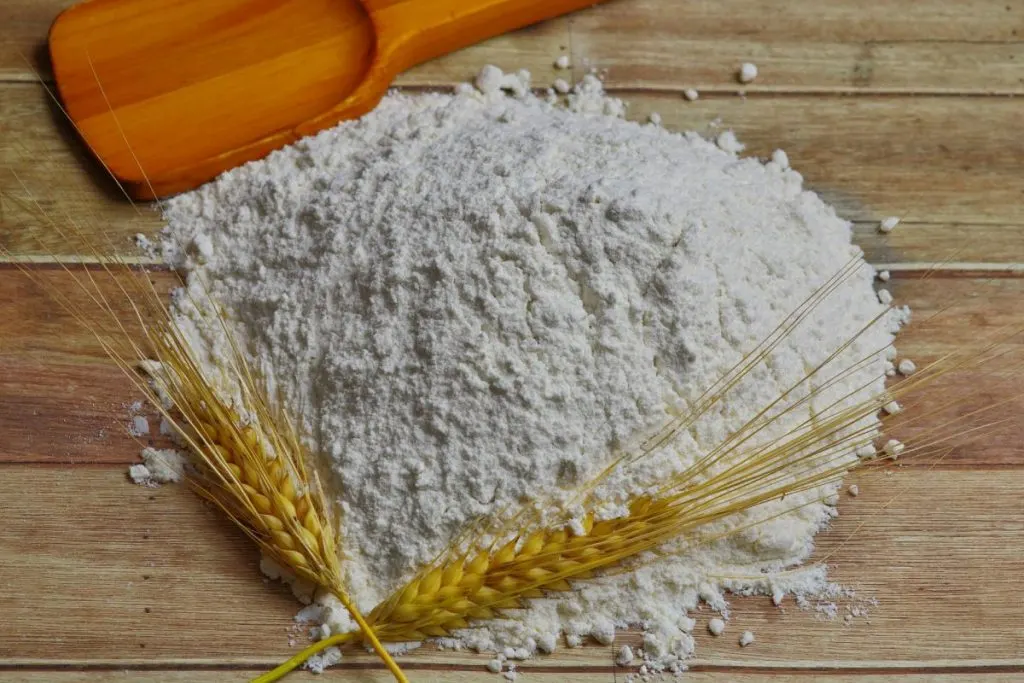Sourdough is an ancient art, a science experiment, and a delicious hobby all rolled into one. But before your loaf rises tall and proud, there’s one quiet, unglamorous hero that determines your success: flour. If your starter isn’t thriving, bubbly, and happily fermenting, your flour might be the villain in disguise.

So how do you choose the best flour for sourdough starter—especially with so many shelves crammed with options?
TL;DR – Quick Starter Crumbs
- Whole wheat flour jumpstarts fermentation thanks to its rich nutrient profile.
- Unbleached all-purpose flour is a stable, widely available choice for maintenance.
- Organic flours are starter-friendly, with fewer chemicals and more wild yeasts.
- Rye flour creates wildly active starters—great for quick boosts.
- Bleached and enriched flours = starter mood killers (avoid them when possible!).
Why Flour Matters More Than You Think
Before you blame your sourdough for being lazy, flat, or weirdly sour—take a hard look at what you’re feeding it. Flour isn’t just background noise in the starter symphony—it’s the lead singer. Let’s unpack why the type of flour you use is way more important than most bakers realize.
The Starter’s Diet Shapes Its Behavior
Flour is more than just food—it’s the entire ecosystem your wild yeasts and bacteria depend on. Think of your sourdough starter like a tiny pet: feed it well, and it thrives. Give it empty carbs, and it sulks. This means flour affects everything—activity levels, aroma, flavor, and even texture.
“People blame the starter when it’s the flour acting shady.”
Whole Wheat, Rye, or All-Purpose? Let the Crumbs Fall Where They May
Choosing the right flour isn’t just a technical detail—it’s the flavor-defining, fermentation-fueling, rise-determining move every sourdough baker makes. Whether you’re nurturing a brand-new starter or maintaining a bubbly veteran, the flour you pick sets the tone for every bake that follows. Let’s break down the best options, one grain at a time.
Whole Wheat Flour – The Kickstarter King
Whole wheat flour is the rocket fuel for a new starter. Packed with bran, germ, and endosperm, it’s full of the nutrients wild yeasts crave.
Perks:
- Speeds up fermentation during early days
- Rich in minerals and enzymes
- Attracts more wild yeast from the environment
Sandra’s tip:
“I always recommend starting with whole wheat for the first 3–5 days before switching to a milder flour. It’s like giving your starter a triple espresso shot.”
Unbleached All-Purpose – The Reliable Workhorse
While it’s not flashy, unbleached AP flour is a great flour for maintaining a mature starter. It’s consistent, easy to find, and doesn’t go bad quickly.
Good to know:
- Easier to handle and stir daily
- Slower fermentation = better predictability
- Won’t introduce too many flavor variables
Watch out: Bleached flour is a no-go—it’s treated with chemicals that can harm your microbes.
Organic Flour – Clean Eating for Starters
Flour treated with pesticides or preservatives can disrupt microbial balance. That’s why organic options often make for healthier, happier starters.
Pros:
- Fewer toxins = stronger yeast growth
- Encourages more active bubbling
- Better flavor development over time
Insider tip:
Organic rye or spelt can supercharge sluggish starters in winter when fermentation slows down.
Rye Flour – The Party Animal of Flours
Rye flour is like a DJ that gets the microbes dancing. It’s high in enzymes and low in gluten, so it ferments quickly and smells divine.
Why it rocks:
- Helps revive sad, neglected starters
- Adds deep, malty flavor
- Works wonders in cooler climates
Best use: Throw in a tablespoon of rye once a week, even if your main flour is white. It’s the microbial version of “treat yourself.”
Flour Faux Pas: What to Avoid ❌
Not all flours are starter-friendly. Some look innocent on the shelf but turn into total mood-killers once they hit the jar. If your sourdough starter seems sluggish or unpredictable, these common flour missteps might be the culprits. Let’s call them out.
Bleached Flours
They’re processed with benzoyl peroxide or chlorine—chemicals that can mess with yeast colonies and slow fermentation.
Enriched Flours
Iron and vitamins added in enriched flours may sound nice on a cereal box, but they don’t help your starter. In fact, they can be hard for microbes to digest.
Super Refined or “Ultra-Fine” Flours
Too processed = too little nutrition. Starters need micronutrients, not fluff.
Starter Lifecycles: Which Flour to Use When
Just like us, sourdough starters go through phases—and their flour needs change along the way. What fuels that wild microbial party on Day 1 won’t cut it once your starter settles into a rhythm. Here’s a simple roadmap for feeding the right flour at the right time.
Days 1–5: Whole Wheat or Rye
Jumpstart microbial activity with whole grains for a bubbling kickoff.
Days 6–10: Transition to AP Flour
Gradually switch to unbleached all-purpose if you want something easier to maintain.
Mature Stage: Blend of AP + Rye (Optional)
Maintain stability with AP but toss in a bit of rye now and then for activity boosts.
Real-Life Baking Tales: What the Pros Use
Let me take you back to a workshop I led in Portland—not your average sourdough class. We had everyone from tattooed baristas to sourdough grandparents in aprons, and every single baker had opinions about flour.
One guy proudly used Red Fife and swore it gave his loaves “soul.” He called it the jazz musician of flours. Meanwhile, a quiet home baker in the back stuck to King Arthur All-Purpose like it was her baking Bible—“It’s predictable,” she told me, “and my starter never throws a tantrum with it.”
That day reminded me: there’s no universal best flour. What matters most? Finding the one your starter vibes with—and sticking to it once the bubbles start singing.
Here are some common combos:
- Beginner-friendly: 50/50 whole wheat + AP
- Flavor-forward: 25% rye + 75% AP
- Low-maintenance: 100% unbleached AP
Secret Starter Hacks
- Switch flours seasonally. Rye in winter, AP in summer.
- Use filtered water if you live in a chlorinated area—it helps more than you think.
- Double feed once a week with whole wheat to keep the microbes excited.
- Keep a rye-only “backup starter” in the fridge. It stays active longer.
Conclusion: Give Your Starter the VIP Flour Treatment
At the end of the (loaf-shaped) day, picking the best flour for sourdough starter isn’t about brand loyalty—it’s about giving your microbes the right meal. If you treat your flour choice like the foundation of your starter’s health, you’ll bake loaves that taste better, rise higher, and impress even your snobbiest foodie friend.
Your flour is your starter’s personality. Choose wisely.
FAQs – Your Starter Questions Answered
Can I use bread flour for my sourdough starter?
Yes! Bread flour is higher in protein and works well, especially for a stronger gluten structure. It’s not ideal for starting a new culture, but great for maintenance.
Why is my starter not rising with all-purpose flour?
Your AP flour might be bleached, too old, or lacking nutrients. Try switching to whole wheat or rye to boost activity.
Is organic flour better for sourdough starters?
Yes. Organic flours often contain more wild yeasts and fewer additives, which means healthier fermentation.
How often should I change the flour I feed my starter?
Not often unless you’re seeing slow activity. Mixing in small amounts of whole wheat or rye weekly can help without full changes.
What flour do professional bakers use for starters?
Many use blends. King Arthur AP or Bob’s Red Mill Rye are favorites, depending on their bakery’s climate and taste goals.
Can I mix flours when feeding my starter?
Absolutely. Mixing flours is a common technique to balance flavor, texture, and activity.
What’s the best flour for sourdough starter in winter?
Rye flour, hands down. It ferments quickly and helps your starter stay active in colder temperatures.
Does bleached flour kill sourdough starters?
It doesn’t kill it immediately, but it slows microbial growth and can lead to weak, inconsistent starters.
Should I use stone-ground flour for my starter?
Stone-ground flours retain more of the grain’s nutrients, which can help boost fermentation—just make sure they’re not too coarse.
Is spelt flour good for starters?
Yes, spelt is an ancient grain with great nutrient content and can add flavor complexity to your starter.
Join Us and Transform >
Don’t Be an Amateur! Master the Art of Sourdough Bread!




Leave a comment